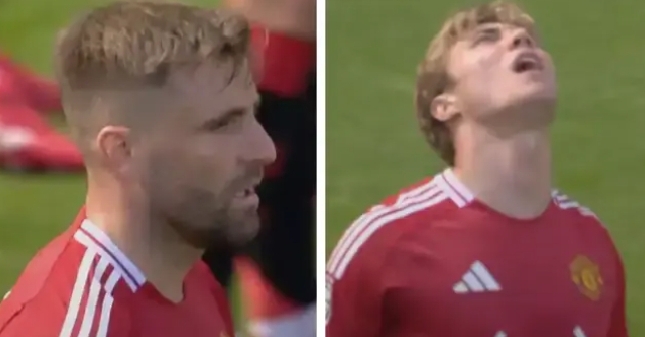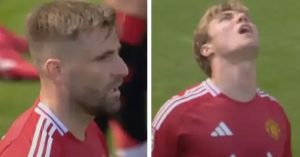
Luke Shaw Screams at Rasmus Højlund in Frustrating Moment Against West Ham
Manchester United’s turbulent 2024–25 season added another tense moment to its growing list of frustrations as Luke Shaw was seen shouting at young striker Rasmus Højlund during a heated passage of play in United’s recent clash against West Ham United. With tensions running high and performances under intense scrutiny, the flashpoint captured by broadcast cameras has sparked debate among fans and pundits alike.
The incident, which occurred midway through the second half of what was a fiercely contested match at Old Trafford, is now being dissected as a symbol of the mounting pressure within the United dressing room. The frustration on Shaw’s face, the visible tension in Højlund’s reaction, and the overall breakdown in communication speak volumes about a team struggling to find rhythm, cohesion, and belief.
The Incident: A Misread and a Missed Opportunity
The flashpoint came in the 67th minute, as Manchester United tried to push forward in search of a decisive goal. With the score level and the momentum slightly in their favor, United found themselves in a promising attacking position. Bruno Fernandes had drifted into the half-space and looked set to thread a ball through for Højlund, who had drifted to the shoulder of the last defender.
However, instead of making the expected diagonal run into the channel — the type of movement United’s system thrives upon — Højlund checked his run. The hesitation allowed West Ham’s defense to recover, and the pass from Fernandes rolled harmlessly out of play. Shaw, who had made an overlapping run in anticipation of the play, turned around visibly furious.
He gestured angrily, shouted in Højlund’s direction, and continued barking instructions even after the play had ended. The cameras caught the exchange clearly, with Shaw seemingly saying, “You’ve got to move! Every time!” The striker, clearly frustrated with himself, simply nodded, head down, without responding.
Shaw’s Role: A Veteran’s Frustration
Luke Shaw, now one of the longest-serving players at Manchester United, has seen plenty of highs and lows during his career at the club. Known for his leadership qualities and defensive consistency, Shaw has become increasingly vocal on the pitch in the absence of some of United’s more experienced leaders due to injury.
In this context, his outburst at Højlund may be viewed as a product of mounting frustration — not just with the striker, but with the broader issues surrounding United’s offensive execution. Shaw, like many senior players, understands the importance of making intelligent runs and maintaining attacking discipline, especially when points are slipping away.
His reaction, though emotional, also reflected a broader truth: United’s attack has been lacking fluency. Despite Højlund’s energy and raw talent, his positional sense and timing still need refinement. Shaw’s visible frustration may have come from repeated examples of miscommunication or poorly timed movement.
Højlund’s Growing Pains
For Rasmus Højlund, this moment is part of a broader narrative: a promising but inconsistent debut season at Old Trafford. After a high-profile move from Atalanta, the 21-year-old Dane arrived with expectations on his shoulders. While he’s shown flashes of the physicality and drive that made him a coveted signing, his development has been under constant scrutiny.
As the lone striker in a demanding system, Højlund has had to learn quickly. Premier League defenders are unforgiving, and the tempo of top-flight English football is relentless. Although his movement and finishing have improved, moments like the one against West Ham remind everyone — including Højlund himself — that he’s still learning.
While some may view Shaw’s reaction as overly aggressive, others argue it could be the kind of tough love that helps mold a top striker. Football, especially at the elite level, is emotionally charged, and such interactions are often more about passion than animosity.
Dressing Room Dynamics
This incident wasn’t the first time tensions between United players have been on display this season. Earlier in the campaign, Fernandes was seen chastising Højlund after a missed opportunity, and similar flare-ups have occurred between other players as the club navigates a season of inconsistency and underachievement.
Manager Erik ten Hag has downplayed such incidents in the past, labeling them as examples of high standards and accountability. But when these moments become frequent and public, they begin to hint at deeper frustrations within the squad.
The squad’s injury problems have forced players like Shaw to take on more leadership, and the burden of guiding younger teammates like Højlund often falls on their shoulders. But there’s a delicate balance between mentoring and berating — one that must be maintained to preserve dressing room unity.
Fan Reaction: Divided Opinions
Unsurprisingly, fan reaction to the incident was split. On social media, some supported Shaw’s actions, claiming it showed the kind of urgency and leadership the team has lacked.
One fan tweeted: “About time someone said it. Højlund’s runs have been off all game. Shaw is right to be demanding more.”
Others were more sympathetic to the young striker’s development:
“It’s his first season, he’s still learning. Yelling at him on the pitch won’t help his confidence.”
This tension between expectation and patience has been a recurring theme in Højlund’s debut year. While fans want immediate impact, there is an understanding that strikers often take time to settle — especially in a league as demanding as the Premier League.
Ten Hag’s Take
In his post-match press conference, Ten Hag addressed the moment directly. “These things happen in football. Luke demands high standards, and Rasmus is growing into this team. We want players to communicate — even if it gets heated. They shook hands after the game, and we move forward together.”
Ten Hag’s calm dismissal of the situation indicates that the coaching staff see it as part of the natural growing process within a squad featuring a mix of youth and experience. But with the Europa League final looming and United’s form still patchy, internal unity will be vital in the final stretch of the season.
What It Means Going Forward
Moments like these, while seemingly minor, can serve as defining touchpoints in a player’s development. For Shaw, it was a display of leadership and a demand for higher standards. For Højlund, it was a reminder of the elite expectations at a club like Manchester United.
The key now is how both players — and the team as a whole — respond. If Højlund can use the criticism constructively and fine-tune his decision-making, the experience may prove invaluable. Similarly, if Shaw can continue to lead by example without allowing frustration to boil over, he will play a crucial role in steering the team through this tricky period.
Conclusion
The confrontation between Luke Shaw and Rasmus Højlund during the West Ham match may have lasted only a few seconds, but it encapsulated much of what Manchester United have struggled with this season: frustration, miscommunication, and growing pains. As the team fights to end their campaign on a high note, the hope is that moments like this forge stronger bonds — not deeper divides.
Would you like a co
mpanion piece on Højlund’s overall season and progress at United?

Leave a Reply